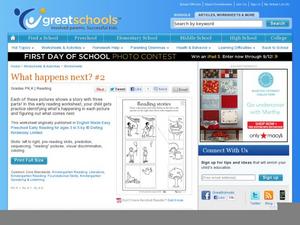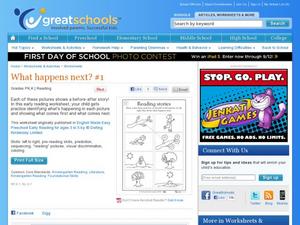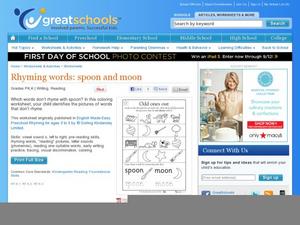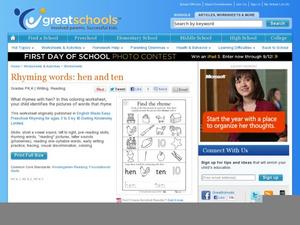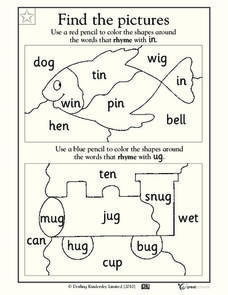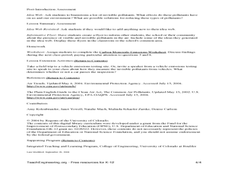Curated OER
Museum Practice for Students
Before any of us can learn to enjoy a trip to an art museum, we need to learn how to behave. This list of activities describe the behavior expected on a trip to an art museum. Each behavior comes with an activity intended to demonstrate...
Curated OER
Interpreting Photographs: Part One
Photography is a wonderful artistic medium used to express feelings, historical events, and nature. This worksheet provides three critical-analysis questions that require learners to take an in-depth look a photograph both physically and...
Curated OER
Play I Spy: In the Bathroom
Usually playing I Spy in the bathroom causes trouble, but not in this instructional activity! Little readers look for objects that begin with the letters b and t. They circle the objects in the picture, count how many of each they found,...
Curated OER
Rhyming Words: Fox and Socks
What rhymes with the word fox? Actually there are quite a few words that contain the short o vowel sound and rhyme with fox. Pre-readers find, color, and circle the objects in the picture that rhyme with the sly looking fox. They also...
Curated OER
Odd One Out
Which of these wacky shapes is different? Learners examine five rows of figures, each with a starting shape at the beginning. They determine which of the four following shapes looks different from the first, circling it. Consider having...
Curated OER
Draw it Yourself
Here are four familiar pictures and words for emerging readers: dog, mouse, cat, and hen. After examining the image and spelling, they draw something that rhymes with each in the space provided. Encourage pre-readers to sound out words...
Curated OER
What Happens Next: 2
What happens next? That is a great question that requires learners to think about the sequence of events then make a prediction. They assess the pictures on the left and draw lines to the pictures on the right that show what will happen...
Curated OER
What Happens Next? 1
Knowing how to sequence events means you have to know what happens before and after. Little ones draw a line from four before images to the images that show what happened next. This is a good challenge for your youngest learners.
Curated OER
Rhyming Words: Spoon and Moon
One of these things is not like the other, one of these things does not belong. It's true! Little learners will say each of the four words in each of four rows, to determine which one does not rhyme with the others. After that, they...
Curated OER
Find the Rhyme
Find the rhyming word. All of these rhyming, single-syllable words have the short i sound, but learners have to determine which ones they are. There are four starting objects each heading a row of three objects. They examine the three,...
Curated OER
Find the Rhyme
Which of these objects rhymes? There are four starter pictures here, each heading rows of three objects. Learners determine and circle the row object that rhymes with the first one. Then, they connect two of the CVC words with printing...
Curated OER
Rhyming Words: Hen and Ten
It's rhyme time! Little ones look at the image in each of four rows, they then circle an image that rhymes. They match four rhyming words and trace the words hen and ten.
Curated OER
Rhyming Words: Ball and Wall
Preschoolers and kindergartners can identify the pictures that do not rhyme with the lead image. They say each of the four words and then find the image that doesn't belong. In addition, they trace the words ball and wall.
Curated OER
Connect the Rhymes
Pre-readers benefit from visual context clues like the ones in this rhyme worksheet. There are two sets of objects here, and scholars connect objects on the left with their rhyming counterparts on the right. Each word has the vowel...
Curated OER
Find the Rhyme
Which one rhymes? There are four starting objects here, each heading a row of three objects. Learners identify the objects and their vowel sounds to determine which one rhymes with the first object. All these rhyming words involve the...
Curated OER
Matching Directions
Which of these shapes is pointing the same way? Pre-readers examine five rows of familiar objects. The first item points to the right for each, and they must determine which of the subsequent items in each row points the same direction....
Curated OER
Odd One Out
Which word doesn't rhyme? As they practice vowel-sound recognition, scholars examine rows of familiar objects to determine which object doesn't rhyme. There are four rows here, each with a beginning image and three subsequent images....
Curated OER
Connect the Rhymes
Connect these rhyming images. There are two sets of six familiar pictures here, and scholars draw a line from the left objects to their rhyming partners on the right. The images may be difficult for learners to identify, so be sure this...
Curated OER
Find the Pictures
Uncover the hidden pictures. There are two sets of shapes here, and each has a CVC word inside. Beginning readers follow directions by coloring all the shapes with words that rhyme with a given sound (in for the first and ug for the...
Curated OER
Connect the Rhymes
Introduce your pre-readers to rhyming using this matching exercise! They examine two sets of images, connecting rhyming pictures with a line. All 10 words use the vowel sound i. Note that some of these images may be difficult for kids...
Curated OER
Match the Pictures
Which of these objects are the same? Get your pre-readers comfortable with identifying objects that are identical, focusing on the term same. They examine eight pictures, drawing a line between those that are the same. The objects should...
Curated OER
Connect the Rhymes
As your pre-readers begin to understand phonemes and rhyming, give them this practice worksheet which has them matching rhyming pictures. For each of six images, they identify the corresponding image which has the same vowel sound (or...
Curated OER
Draw it Yourself
What rhymes with fox? Get learners engaged with rhyming words through this drawing worksheet featuring four single-syllable words for beginning readers. For each, they draw something that rhymes with the word. Challenge learners who need...
Curated OER
I Don't Believe My Eyes!
Students develop their understanding of the effects of invisible air pollutants. For this invisible air lesson, students complete experiments with a rubber band air test, a bean plant experiment and by exploring engineering roles related...








